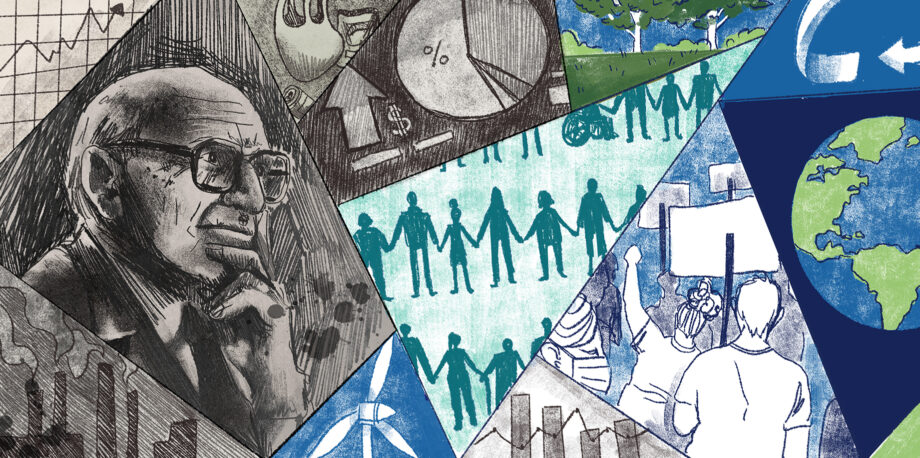September 24, 2020 — Demands for racial justice, the global pandemic and ensuing recession, the chaos of U.S. presidential politics, and the growing urgency of the climate crisis are forcing companies to reckon with their role in society. The longstanding tenet of American capitalism that companies should focus on profit alone now seems woefully inadequate given the massive problems we face. It is clearer than ever that companies must focus on environmental and social issues — particularly those that business has caused or exacerbated, and for which they might have the resources and interest to help solve.
As we grapple with this emerging reality, we need to revisit the article that cemented the tenet of profit maximization in the foundation of the American capitalist psyche: Nobel Prize–winning economist Milton Friedman’s New York Times Magazine essay, “The Social Responsibility of Business Is to Increase Its Profits,” which was published 50 years ago this month.
Others had made similar arguments before — most notably Adam Smith, an 18th-century economist who wrote about the challenge of ensuring that managers act in the interest of the company’s owners. But the hyperbolic clarity of Friedman’s article, which claimed that social responsibility is “pure and adulterated socialism” and “hypocritical window dressing,” gave it a permanent seat on the spiritual board of America Inc. Half a century later, every statement about the role of business, from last year’s Business Roundtable proclamation to U.S. presidential candidate Joe Biden’s unveiling of his economic plan, acknowledges Friedman’s argument before offering an alternative.
But just as we are taking down Confederate statues across the country, with many people recognizing that the ideas they represent should have no place in a fair and just society, it’s time to take Friedman’s treatise off its pedestal.
The two of us have taught, mentored and worked with hundreds of emerging business leaders over the years. We have always given Friedman’s article a prominent place in our syllabi and conversations as the starting point for where business is today — the framework that those who advocate for companies to embrace human rights and the environment have to fit into.
What if the market is built on inequality and coercion? “Unanimity” now reads as upholding the white supremacy and patriarchy that has underpinned our economy since its foundations in slavery, and systematically excludes and discriminates against women and people of color.
But rereading it in 2020 — when these future leaders are demanding new paradigms that will better serve people and the planet — we now believe it deserves outright rebuke.
Three key points are particularly problematic:
1) Friedman asserted that the markets work because of “unanimity”: that all parties enter every exchange voluntarily. He wrote that in an ideal free market, “no individual can coerce any other, all cooperation is voluntary, all parties to such cooperation benefit or they need not participate.” But what if the market is built on inequality and coercion? “Unanimity” now reads as upholding the white supremacy and patriarchy that has underpinned our economy since its foundations in slavery, and systematically excludes and discriminates against women and people of color.
2) Friedman assumed that an unfettered market would coexist with a competent and accountable government. Remember our “system of checks and balances” and our “elaborate constitutional, parliamentary and judicial functions”? Friedman pointed to these as assurances that government would take care of our societal needs fairly and equitably.
While we do not want companies dictating social policy and assuming public-sector responsibilities, when government rejects its basic duties, as the Trump administration is now, companies must ensure that human rights are respected and the environment is protected. In the face of government inaction, companies are stepping up to set ambitious targets for reducing greenhouse gas emissions, manufacture personal protective equipment for healthcare workers, and even provide polling sites on Election Day.
To be sure, companies need profits to survive, and our current stage of capitalism has delivered wealth and innovation to many. But at what cost? It has lifted millions of people around the world out of poverty just to put so many of them on the brink of falling back into it and irreparably damaged Earth in the process.
Even as some of our students appreciate Friedman’s desire for social responsibility to be left to the government, they don’t believe that’s the way the world actually is — or should be. As Laura Denick, a senior at Emory University, said to us after she read the Friedman article: “I was thrown off by the fact we [as business leaders] shouldn’t care about everyone, and our responsibility is not to society — that just felt so wrong to me. I think this is such a cool opportunity for business to do better and to raise the bar.”
3) Friedman declared that corporate executives should consider their sole responsibility to be acting as “the agent of the individuals who own the corporation,” with any social interests to be indulged with their personal time and money.
But employees at all levels are increasingly unwilling to check their identity and morals at the door, as evidenced by Amazon and Microsoft workers striking to protest their companies’ relationships with fossil fuel companies; NBA and WNBA athletes refusing to play in the wake of Jacob Blake’s shooting by police in Kenosha, Wisconsin; and staff at numerous tech companies protesting their employers’ government contracts. Granted, companies need to walk a fine line between encouraging people to bring their whole selves to work and inviting chaos. But the #MeToo and antiracist movements have highlighted how the business world has marginalized the voices of women and people of color under the guise of corporate purpose. People should not have to sacrifice their agency to toe the company line.
Some still argue, as Friedman did, that company managers are unprepared to solve social problems. We agree this is often the case — but it is a ludicrous and dangerous abdication of responsibilities to accept this status quo.
To be sure, companies need profits to survive, and our current stage of capitalism has delivered wealth and innovation to many. But at what cost? It has lifted millions of people around the world out of poverty just to put so many of them on the brink of falling back into it and irreparably damaged Earth in the process. While many traditional economic indicators have shown vast improvement over the past 50 years — GDP, the stock market, the market capitalization of our largest companies — economic inequality is at an all-time high and the planet is on the verge of environmental collapse.
Some still argue, as Friedman did, that company managers are unprepared to solve social problems. We agree this is often the case — but it is a ludicrous and dangerous abdication of responsibilities to accept this status quo. It’s time for companies to hire and build expertise in social and environmental sustainability — which have become part of “the basic rules of the society” that Friedman says business must follow.
Going forward, we will continue to include Friedman in our syllabi. But we will teach it as a relic for what people used to believe, rather than the model of capitalism that we need today. For the latter, we will look to businesses that are adopting metrics and principles to embed the environment and human rights into how they do business; models of regenerative, place-based and community-owned finance; and the significant growth of impact investing, including those shareholders who realize that prosocial behavior is good for companies and society alike.
Our current moment is compelling us to redefine the purpose of a corporation, as we have many times over the past 300 years. This time, let’s do it out from under the shadow of Friedman’s outdated words, and build a new economy that better serves people and planet. As Jason Tayer, a junior at Emory, told us: “It all comes back to what we define as the responsibility of a corporation, and that’s up to us. It’s not set in stone, and we can set that narrative.”
Editor’s note: The views expressed here are those of the author and not necessarily of Ensia. We present them to further discussion around important topics. We encourage you to respond with a comment below, following our commenting guidelines, which can be found on this page. In addition, you might consider submitting a Voices piece of your own. See Ensia’s Contact page for submission guidelines.
Related Posts
Ensia shares solutions-focused stories free of charge through our online magazine and partner media. That means audiences around the world have ready access to stories that can — and do — help them shape a better future. If you value our work, please show your support today.
Yes, I'll support Ensia!






Mutual companies which are owned by their customers would seem to be a much better approach. If you throw in having customers working there then you eliminate the contention between owner, customer and employee, since they are one in the same.